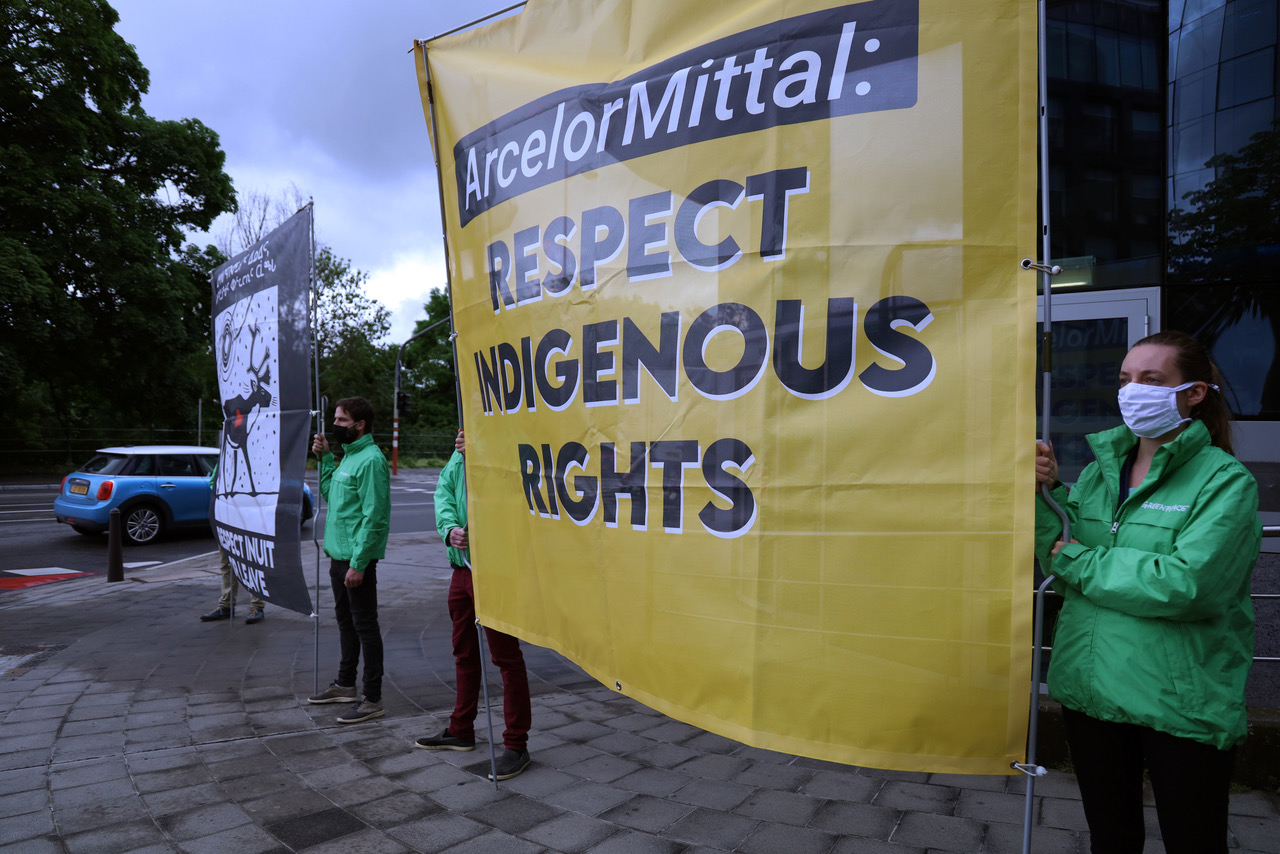A Luxembourg protest brings opposition to a Nunavut mine expansion to the world stage
Greenpeace, which organized the protest, said it was acting in solidarity with Nunavut Inuit groups.

While a public hearing on Baffinland Iron Mines Corp.’s expansion project is on hold, a Greenpeace protest at the headquarters of the mining company’s co-owner in Luxembourg has stoked fires of opposition to the development proposal.
Last week, eight activists from the environmental advocacy organization picketed outside ArcelorMittal headquarters, a parent company and primary international ore supplier of the Nunavut mining enterprise.
Hoisting a banner that read “Respect Indigenous Rights,” along with an illustration by Indigenous artist Christi Belcourt that said “Respect Inuit or Leave,” Greenpeace representatives said the protest was an act of solidarity with local Inuit groups, such as the Nuluujaat Land Guardians.
Alex Speers-Roesch, a Greenpeace Canada spokesperson, said the organization wanted to offer support after watching the situation escalate in February when the Nuluujaat Land Guardians faced an injunction for blocking access to the tote road and airstrip at Baffinland’s Mary River mine.
The group, comprised of Inuit hunters from Pond Inlet, are still under the injunction. Speers- Roesch said the organization reached out to the Nuluujaat Land Guardians to see how it could help garner a larger audience.
“It seemed like concerns of the Inuit were not being addressed by the company,” he said. “ArcelorMittal has a lot of influence over what Baffinland does and so we want to make sure they are fully aware of the bad behaviour of this mining company and help ensure a good outcome that respects human rights and protects the Arctic environments.”
The Mary River mine generates 24 percent of Nunavut’s gross domestic product and employs 288 Inuit. Baffinland’s Phase 2 expansion project aims to double the mine’s output of iron ore at Mary River from six million tonnes to 12 million tonnes per year and build a railroad to a port at Milne Inlet that would allow more ships to transport larger quantities of iron ore to market.
The existing mine and the expansion proposal have faced concerns from the Inuit and environmentalists as the mine is situated near a marine conservation area that is also narwhal calving grounds and harvesting areas for Inuit communities. The proposed railroad would run through a caribou migration route and opponents say the mine’s expansion would further disrupt Inuit culture that is rooted in the land, hunting and dependent critically on healthy Arctic wildlife populations.
Lori Idlout, a lawyer representing the Nuluujaat Land Guardians, said she feels Greenpeace’s protest provides greater visibility to Inuit voices that have been drowned out and excluded in the mining company’s plan to expand.
“People should know that when the land guardians first protested, it was because they weren’t being heard,” she said. “The core of what the land guardians have maintained is protecting the environment, protecting the wildlife — it’s literally in their name.”
Baffinland is in the midst of an application to the Nunavut Impact Review Board on its Phase 2 expansion project. A public hearing on that application resumed in April, but was cut short due to the COVID-19 outbreak in Iqaluit. In an emailed statement from Heather Smiles, Baffinland’s manager of stakeholder relations, she said that the company respects the right to free speech and peaceful, legal protests.
“Baffinland is committed to operating in a responsible manner and in accordance with all applicable regulations,” Smiles wrote.
Greenpeace representatives said that it would continue to amplify Inuit voices and environmental concerns, as the situation around the expansion proposal evolves.